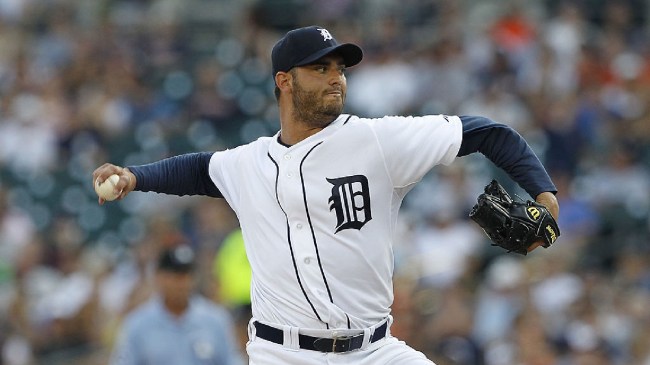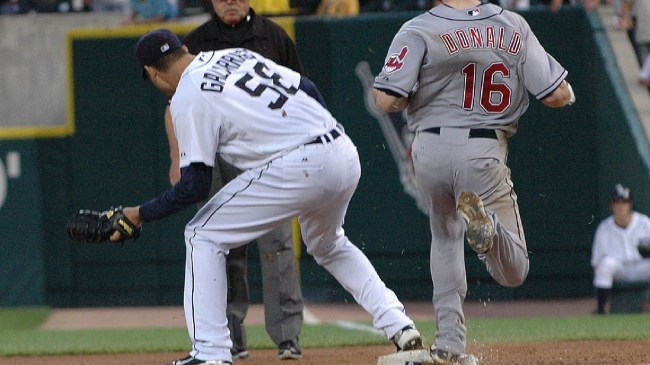
Getty Image
One of the toughest things a baseball player can do is pull off a perfect game, and former Tigers pitcher Armando Galarraga got about as close as you can get to doing exactly that on June 2, 2010.
While he may not officially be remembered in the MLB record books, you’d be hard-pressed to find many baseball fans out there who wouldn’t tell you Galarraga did, in fact, manage to throw a perfect game on that fateful evening if not for one of the most brutal blown calls in the history of the sport.
If you’re not familiar, a perfect game is one of the rarest achievements in any sport. While it’s technically a team effort, it requires a pitcher to send every single batter he faces back to the dugout without having the scorecard tarnished by a single hit, walk, or error; it’s 27 guys up and 27 guys down.
It’s a truly incredible feat, and in the entire history of the MLB, there have only been 24 perfect games.
For context, around 235,000 games have been played in close to 150 years the league has existed, which means around .000102% of them have resulted in a perfect game. That’s how rare it is.
There have been a decent number of “Almost Perfect Games,” which aren’t an official stat but refer to spotless showings that have been broken up in the ninth inning—or, if you’re particularly unlucky, on what would’ve been the final out.
The only fate worse than that is actually pitching a perfect nine-inning contest without officially securing a perfect game, which has happened twice in the history of the league.
In 1959, Harvey Haddix of the Pittsburgh Pirates was facing the Milwaukee Brewers and went nine innings without allowing a single walk or hit in an errorless game.
Unfortunately, his team had failed to score a single run, and while Haddix pitch three more spotless frames for a grand total of 12 (12!) perfect innings, Pittsburgh was still unable to contribute to the cause and he lost the bid (and the contest) after giving up a run in the 13th.
Pedro Martinez did something very similar while playing for the Montreal Expos in 1995. He was perfect through nine innings against the Padres but had to take the mound for the 10th after his team took a 1-0 lead in the top of the frame. While he was eventually credited with the win, he gave up a single double to lose both the perfect game and a potential no-hitter.
However, I’d argue neither of those developments were as devastating as the one that helped Galarraga go down in history for all of the wrong reasons.
How Jim Joyce screwed Armando Galarraga out of a perfect game

Getty Image
On June 2, 2010, Detroit tapped Galarraga to start when they hosted Cleveland for a showdown at Comerica Park
That turned out to be a good call, as Galarraga was perfect after 8 and 2/3 innings. The Tigers had a 3-0 lead with two outs in the bottom of the ninth, so while the game was essentially over, all eyes were on the mound to see if the pitcher would be able to make history.
Cleveland’s hopes rested on the shoulders of rookie infielder Jason Donald, who stepped up to the plate hoping to not just end the perfect game but give his squad a chance to mount an unlikely comeback. However, it look like he’d failed in that quest when he hit a routine ground ball that Tigers first baseman Miguel Cabrera scooped up and tossed to Galarraga for the out that sparked a massive celebration.
Or at least that’s what should have happened…
Anyone who saw the play unfold could clearly see Galarraga beat Donald to the bag by a full step—aside from first base umpire Jim Joyce, who issued an emphatic “Safe” call.
In an era where MLB teams didn’t have the luxury of using instant replay to appeal, Galarraga and the Tigers were simply forced to accept Joyce’s verdict. To his credit, the pitcher composed himself and got Trevor Crowe to ground out on the ensuing at-bat to end a game that went down into the books as a one-hit shutout.
Listen, umpires are human, and humans make mistakes. With that said, I don’t know how you make this mistake.
Joyce was obviously aware of the situation, and while it’s his job to be fair and impartial, in a situation like this, you have to call the runner out if there’s even a sliver of doubt the pitcher managed to get there in time.
The now-retired Joyce (unlike some of his peers at the time) was an incredibly well-respected umpire who was admittedly devastated by the call. He wasted no time admitting he screwed up after taking a look at the replay after the game and admits the error still haunts him to this day.
As a result, you do have to feel a bit bad for Joyce, but you also have to feel much, much worse for Galarraga. The guy wasn’t exactly a superstar (he only played in the MLB for five seasons when everything was said and done), and getting that close to baseball history only to have it stripped away by an ump has to be a terrible feeling.
To his credit, Galarraga took it like a champ and genuinely seemed to have no hard feelings toward Joyce; he even took the lineup card out to the plate before the game the following night as a sign of sportsmanship to Joyce, which understandably led to the umpire shedding a few tears during the emotional moment that made it clear the water was under the bridge.
Armando Galarraga is a bigger man than I’ll ever be.